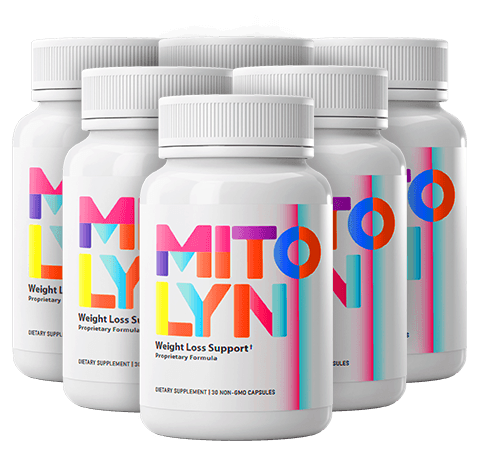Revitalize Your Gut Health: A Comprehensive Guide
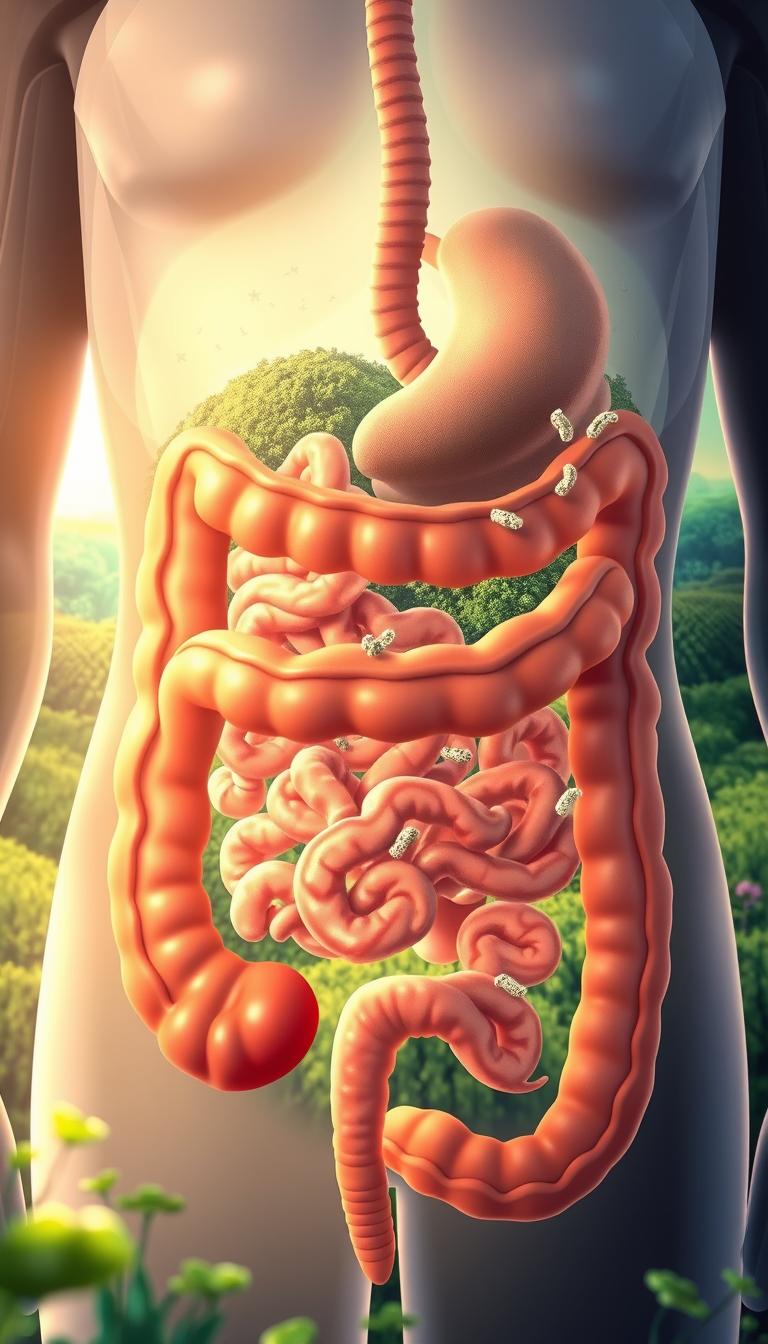
Ever felt bloated after eating or tired for no reason? Your gut health might be the key to feeling better. Your digestive system is home to trillions of microbes that help you stay healthy. When these microbes are out of balance, it can mess with digestion and mood.
Science reveals your gut has over 200 types of bacteria, viruses, and fungi. A healthy gut can lower risks of diabetes, joint pain, and skin problems. This guide will show you how to improve your gut health with simple, science-backed steps.
Imagine waking up feeling lighter, more energized, and without digestive issues. This journey begins with learning how foods like yogurt, sauerkraut, and green tea can help your gut. We’ll look at how small changes can lead to big improvements in gut health.
Key Takeaways
- A healthy gut microbiome includes 200+ microbial species linked to overall wellness.
- Probiotics in foods like kimchi and kombucha help support digestive balance.
- High-fiber foods like bananas and asparagus feed good bacteria, promoting microbiome diversity.
- Poor gut health may cause bloating, skin issues like psoriasis, and sleep disruptions.
- Reducing sugary snacks and fried foods protects against inflammation and gut imbalance.
Understanding the Importance of Gut Health
Your gut is more than a food processor. It affects your mood, energy, and skin. A healthy gut needs microbiome diversity and gut bacteria balance. These keep you safe from inflammation and disease.
Constitutes a Healthy Gut?
A healthy gut has many different bacteria. This microbiome diversity helps digest food and fight off bad germs. Without it, you might feel bloated, tired, or even get sick often.
- Healthy gut: 800+ species of bacteria
- Key functions: digestion, immunity, nutrient absorption
The Role of Your Gut in Overall Wellness
Your gut is like your body’s control center. It makes 95% of your serotonin, which makes you feel good. Poor digestive health importance can make you anxious or depressed.
Scientists say your gut and brain talk to each other. A 2019 study found bad gut health can raise your risk of diabetes and heart disease.
“The gut is your second brain.”
How Your Digestive System Impacts Immunity
Did you know 70–80% of your immune cells live in your gut? A weak gut lining (leaky gut) lets toxins in, causing inflammation. This can lead to diseases like rheumatoid arthritis or Hashimoto’s.
A balanced gut microbiome keeps your immune system strong. It protects you from harmful germs.
| Healthy Gut | Unhealthy Gut |
|---|---|
| Strong immune response | Increased infections |
| Stable mood and energy | Brain fog, anxiety |
Recognizing Signs of Poor Gut Health
Spotting early digestive issues or gut imbalance symptoms is key. It leads to better care. Let’s explore what your body might be trying to tell you.
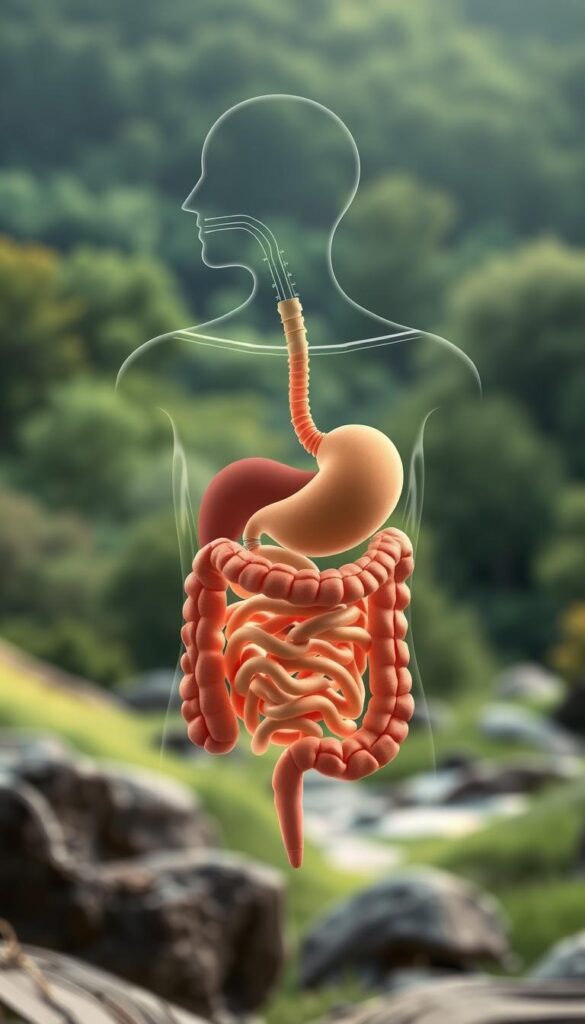
Digestive Symptoms to Watch For
Look out for these common signs:
- Bloating, especially after meals (common bloating causes include poor fiber intake or food intolerances)
- Gas, constipation, or diarrhea lasting over two weeks
- Heartburn or acid reflux persisting beyond occasional discomfort
- Unexplained nausea or loss of appetite
Non-Digestive Indicators of Gut Imbalance
Some surprising symptoms linked to gut health:
| Symptom | Possible Gut Link |
|---|---|
| Chronic fatigue or brain fog | Gut-brain axis disruption |
| Acne, eczema, or psoriasis flare-ups | Inflammation from microbiome imbalance |
| Mood swings or anxiety | Low serotonin production (95% made in the gut) |
| Unintentional weight changes | Microbiome affecting metabolism |
When to Consult a Healthcare Professional
Get medical help if you have:
- Persistent food intolerances causing severe bloating or vomiting
- Blood in stool, severe abdominal pain, or unexplained weight loss
- Symptoms lasting longer than two weeks despite dietary changes
Acting early can prevent serious issues like autoimmune conditions or chronic inflammation.
The Science Behind Your Gut Microbiome
Your gut is home to trillions of microbes. This includes gut flora diversity that keeps you healthy. These tiny helpers, like intestinal bacteria, viruses, and fungi, weigh as much as 1–2 kg (2–5 lbs). They help digest food, make nutrients, and boost your immune system.
- Breaks down complex foods your body can’t process alone
- Produces vitamins like B12 and K2
- Trains your immune system to fight invaders
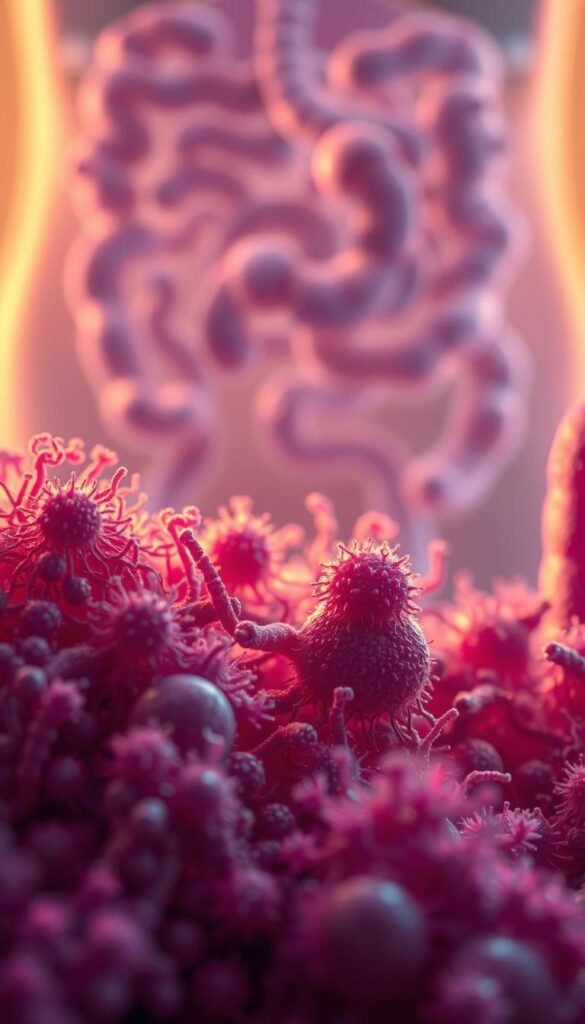
| Beneficial Roles | Harmful Imbalances |
|---|---|
| Helps control blood sugar | Linked to type 1 diabetes when disrupted |
| Produces serotonin (95% made in the gut) | Leads to brain fog or mood swings when out of balance |
| Blocks harmful pathogens | Increases infection risk during imbalance |
Recent microbiome research shows how your gut affects your heart. Some bacteria make TMAO, linked to heart disease. Others, like Lactobacillus, lower cholesterol. Your gut and brain talk to each other, affecting digestion when stressed or anxious.
Scientists study how diet changes your microbiome. Eating fiber feeds good bacteria, healing your gut. But, antibiotics, alcohol, and processed foods harm this balance. This can lead to IBS, inflammatory bowel disease, and heart issues.
Transforming Your Diet for Optimal Gut Health
Your gut loves foods that help good bacteria grow and reduce inflammation. Making small changes in what you eat can make a big difference. Let’s look at how to feed your microbiome with foods backed by science.
Fiber-Rich Foods Your Gut Will Love
Prebiotic foods like beans, oats, and bananas feed your gut’s good bacteria. A study of 21,000 people found that plant-rich diets boost microbiome diversity. Try to eat 22-34g fiber daily from whole grains, leafy greens, and legumes.
The Mediterranean diet is a natural anti-inflammatory diet. It helps bacteria like Bifidobacterium make immune-boosting short-chain fatty acids.
| Food Group | Examples | Benefits |
|---|---|---|
| Leafy Greens | Spinach, kale | Vitamins and fiber for microbiome diversity |
| Cruciferous Veggies | Broccoli, cauliflower | Sulfur compounds support detox pathways |
| Root Vegetables | Beets, carrots | Pectin fiber feeds beneficial bacteria |
Fermented Foods and Their Benefits

Probiotic foods like yogurt, kimchi, and miso give live bacteria. They help with digestion and boost the immune system. Choose unpasteurized options to keep live cultures.
- Sauerkraut: Rich in Lactobacillus strains
- Kefir: Contains up to 61 probiotic strains
- Pickles (brine-cured, no vinegar)
Foods to Limit or Avoid
Try to eat less of refined carbs, sugary snacks, and fried foods. Avoid processed meats and artificial sweeteners. Instead, drink herbal teas or infused water.
Hydration and Gut Function
Water helps with nutrient absorption and waste removal. Drink water between meals to avoid bloating. Herbal teas like peppermint or ginger can help with digestion without added sugars.
“Diet shapes your gut’s ecosystem daily.”
Start by replacing one processed snack a week with a pear or handful of almonds. Small changes can lead to big improvements over time.
Supplements and Probiotics Worth Considering
When your diet needs extra support, certain supplements may help. Probiotic supplements with strains like Lactobacillus rhamnosus GG or Saccharomyces boulardii can support digestion and immunity. Prebiotic fiber, found in supplements like inulin or acacia gum, feeds your existing gut bacteria. Digestive enzymes break down fats, proteins, or carbs, easing bloating. Gut healing supplements like L-glutamine might aid intestinal lining repair.
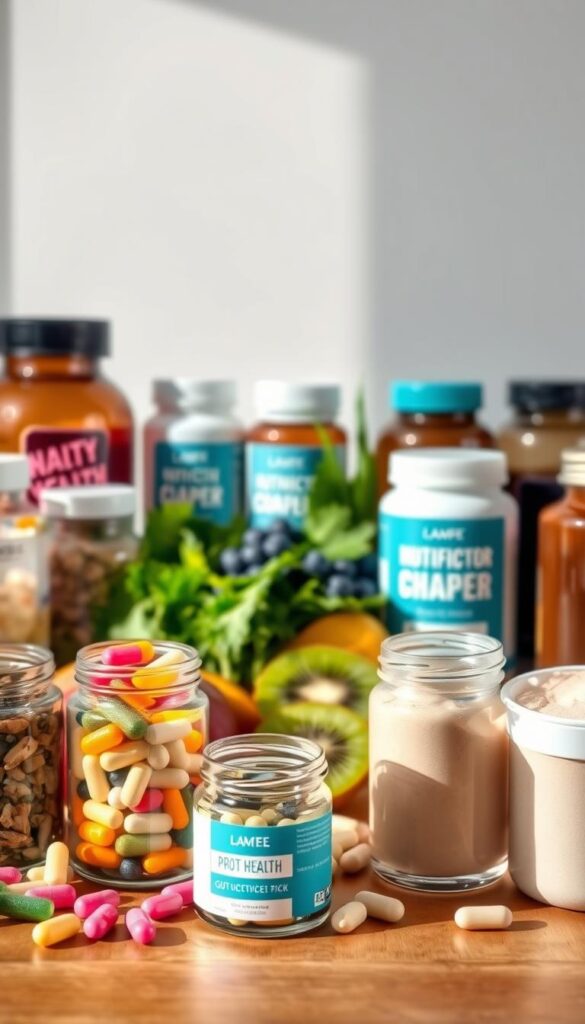
- Probiotic supplements: Opt for strains backed by studies, like Bifidobacterium infantis for mood-related gut issues.
- Prebiotic fiber: Choose options with raw chicory root or Jerusalem artichoke to boost microbial diversity.
- Digestive enzymes: Try lipase or protease if you experience post-meal discomfort.
- Gut healing supplements: L-glutamine and zinc carnosate may promote barrier integrity in the gut lining.
Always consult your doctor first—especially if you’re immunocompromised. Not all probiotic supplements are equally effective. Look for brands with third-party testing to confirm strain viability. Pair supplements with a fiber-rich diet for best results.
Lifestyle Factors That Affect Your Gut Health
Your gut health isn’t just about food. It’s also linked to sleep, stress, and exercise. Making small changes in these areas can greatly improve your gut health and overall well-being.

The Sleep-Gut Connection
Not getting enough sleep hurts your gut. On the other hand, a bad gut can mess up your sleep. Try to sleep 7-9 hours each night to help your gut.
Here are some tips:
- Wind down with screen-free time before bed
- Keep your bedroom cool and dark
Managing Stress for a Happier Digestive System
Stress can make your gut unhappy. It causes inflammation and messes with digestion. High stress levels also hurt your gut’s good bacteria.
Here’s how to fight stress:
- 10-minute daily meditation
- Walking in nature
- Deep breathing exercises
Exercise and Physical Activity Benefits
Regular exercise, like walking or yoga, is good for your gut. It boosts the good bacteria in your gut. Even a little bit of exercise each day can help.
Studies show athletes have healthier guts than people who don’t exercise much.
“Exercise increases butyrate-producing microbes linked to colon health.” – Journal of Gut Microbiome Studies
By making these lifestyle changes, you can create a healthier gut. Small, consistent actions today can lead to a stronger gut for the future.
Understanding the Gut-Brain Axis
Your gut and brain talk to each other all the time. This is thanks to the gut-brain connection. The enteric nervous system has over 100 million neurons. This is more than your spinal cord has!
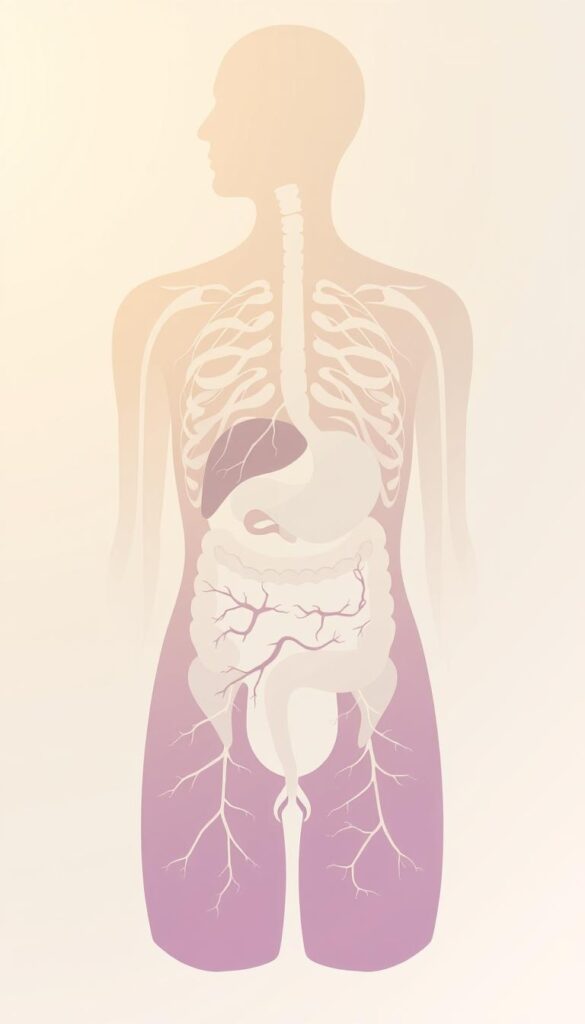
Did you know 95% of your body’s serotonin is made in your gut? Serotonin helps with mood and sleep. If your gut bacteria are off balance, it can mess with your microbiome mental health. This can lead to feelings of anxiety or depression.
- Key Players: The vagus nerve connects your gut and brain. Gut microbes make calming stuff like GABA.
- What’s at Stake? Bad gut health can cause inflammation. This is linked to diseases like Alzheimer’s.
- Hopeful Solutions: Some probiotics and omega-3 foods might help with stress and brain health.
Now, scientists think the gut-brain axis works both ways. Stress can slow down digestion. And irritation in the gut might make you feel moody. For instance, IBS often goes hand in hand with anxiety.
| Gut Factor | Mental Health Impact |
|---|---|
| Low gut serotonin | Mood dips, sleep issues |
| Imbalanced microbiome | Increased anxiety/depression risk |
| High gut inflammation | Reduced focus, brain fog |
Eating fiber and fermented foods helps this connection. Taking care of your gut and mind is good for you. It’s backed by science.
Creating Your Personalized Gut Health Action Plan
Creating a gut health plan doesn’t need big changes right away. Start with small steps that fit your life. Adding fiber-rich foods or drinking more water is a good start. Every choice, like choosing fermented yogurt over snacks, helps.

“Your gut microbiome holds the key to long-term wellness,” says David Bianchi, whose team at the University of Illinois is pioneering microbiome mapping through AI-driven tools.
First Steps to Take Today
Start with these easy changes:
- Drink water instead of sugary drinks to help your gut.
- Eat 1-2 servings of fermented foods like kimchi or kefir each day.
- Use a health app to track what you eat and how you feel.
Weekly Implementation Strategy
Slowly add new habits:
- Week 1: Eat a fiber-rich salad or stir-fry instead of processed food.
- Week 2: Try a probiotic supplement or a gut-friendly smoothie.
- Week 3: Do 20 minutes of light exercise each day to help your gut.
Tracking Your Progress and Adjusting as Needed
Use tools like Viome’s at-home test to check your gut health. Keep a journal for energy, sleep, and digestion. If problems don’t go away, talk to a health expert. Remember, it’s the long-term effort that matters.
Change your routine based on what you learn. Need more fiber? Try chia seeds. Feeling bloated? Note what makes it worse. Small changes keep your plan working well. With time and the right tools, your gut will get stronger every day.
Conclusion: Your Journey to Better Gut Health Starts Now
Your digestive health journey begins with simple choices every day. Deciding on fiber-rich foods like broccoli or drinking water instead of soda helps. These choices lay the groundwork for a healthier gut.
A holistic approach to gut health means eating right and taking care of yourself. Eating fermented foods like yogurt boosts good bacteria. Avoiding processed snacks also helps your gut. Even small actions, like a short walk or a bedtime routine, are important.
Improving your gut microbiome takes time. Some see changes in weeks, while others need months. Keep track of how you feel and celebrate small victories. If problems don’t go away, talk to a doctor.
Start today with a small change. Try herbal tea instead of soda, add spinach to your lunch, or stretch for a few minutes. Every step you take brings you closer to a balanced gut. A healthy gut is a journey of daily choices. Begin small, be patient, and watch your well-being improve.
FAQ
Why is gut health so important for my overall wellbeing?
A healthy gut is key for many health areas. It helps with digestion, immune function, mood, and skin health. A balanced gut microbiome can improve mood, brain function, and immune strength.
What are common signs that I might have poor gut health?
Signs of poor gut health include digestive issues like bloating and gas. You might also see skin problems, fatigue, food sensitivities, or mood changes. These signs show your gut microbiome might be out of balance.
How can I improve my gut health through diet?
Eat a variety of foods that help your gut. Include fiber-rich foods like fruits and veggies. Also, eat fermented foods like yogurt and kimchi. Drink plenty of water. Avoid too much sugar and processed foods.
Are supplements necessary for gut health?
While diet is most important, some supplements can help. Probiotics and prebiotics are good for gut health. But, talk to a healthcare provider before taking any supplements, especially if you have health issues.
How does stress affect my gut health?
Chronic stress can harm your gut health by causing inflammation and digestive problems. Stress can affect your gut-brain axis. Managing stress through mindfulness, exercise, and sleep can help your digestive system.
How can I create a personalized gut health action plan?
To make a plan, start with small diet changes. Add new habits slowly. Keep track of how you feel, including energy, mood, and digestion. This will help you stay on track and make needed changes.
What is the gut-brain axis, and why is it important?
The gut-brain axis is a network between your gut and brain. It affects both mental and physical health. It’s important to understand how gut health impacts mental wellbeing and vice versa.









